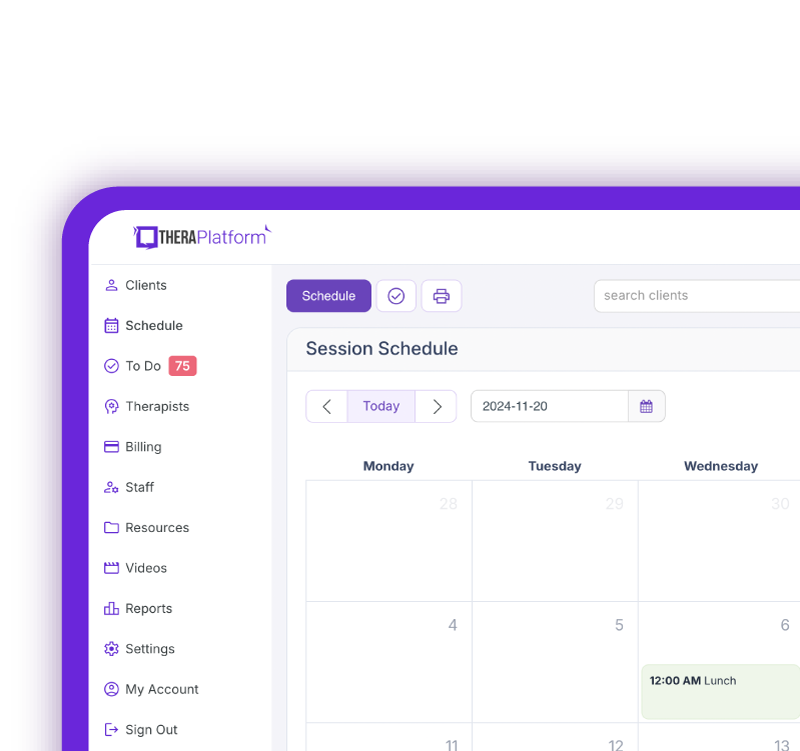AI for speech therapy

Artificial intelligence or AI speech therapy tools can enhance several areas of a speech-language pathologist's practice, from assessment to intervention. AI refers to technology that simulates human intelligence processes through computers and machines. These processes include problem-solving, reasoning, recognizing patterns, decision-making, and prediction.
Summary
- AI tools such as speech recognition, transcription analysis, and NLP help SLPs identify speech disorders, develop individualized treatment plans, and provide real-time feedback to clients—improving accuracy and therapy outcomes.
- AI-powered virtual assistants, adaptive learning platforms, and immersive technologies like VR allow clients to engage in home practice and simulate real-world scenarios, increasing motivation and access to care.
- AI can analyze long-term client data, monitor progress, and adjust therapy strategies accordingly, giving clinicians deeper insights to refine treatment plans. Using an EHR for admin tasks like note taking through AI can help clinicians on the operations side.
- While AI offers promising benefits, SLPs must address privacy, data protection, and algorithmic bias. Ongoing training and integration with traditional approaches ensure ethical, effective implementation in clinical practice.
Streamline your practice with One EHR
- Scheduling
- Flexible notes
- Template library
- Billing & payments
- Insurance claims
- Client portal
- Telehealth
- E-fax

AI speech therapy tools and technologies
AI speech therapy is increasing and revolutionizing how SLPs assess, diagnose, and treat speech and language disorders. AI speech therapy tools can analyze speech patterns, develop individualized intervention plans, provide feedback in real-time during therapy sessions, and enhance therapy outcomes.
Let's explore the use of AI speech therapy tools further.
One tool that can make an SLP's life a bit easier is speech recognition software that transcribes spoken language. Speech therapists can use AI speech therapy tools to analyze these transcriptions for speech disorders, such as articulation errors or disfluencies.
AI speech therapy tools can also benefit a practice in several ways. They can provide increased access to therapy, improve data collection and analysis accuracy and efficiency during evaluations, and use this information to make informed decisions during treatment planning.
Watch this video to discover 3 smart ways AI can speed up your note-taking
→ Start My Free Trial
Clinicians can use AI-powered virtual assistants to provide interactive therapy exercises and feedback outside of individual speech therapy sessions. Clients can use AI tools to complete home practice, engage in therapy sessions, and obtain ongoing support between speech therapy visits.
Speech therapists often obtain and analyze transcribed speech samples to get valuable information about a client's language abilities. AI systems can analyze Natural Language Processing (NLP) during language assessments to provide a comprehensive picture of the client's language skills, identify areas of difficulty, and develop individualized intervention plans.
According to ASHA, language sample analysis is widely recommended in assessing language disorders, though only some SLPs complete this due to lack of time, resources, and training. SLPs can use dedicated software programs such as Computer Language Analysis and Systematic Analysis of Language Transcripts to obtain a detailed analysis of language abilities and potential treatment goals.
How can AI help people with speech disabilities?
Automated speech assessment tools powered by AI technology can allow SLPs to focus on the more complex components of an evaluation, client interactions, and working with families.
Speech transcription analyses are completed through AI algorithms with higher accuracy and speed than traditional methods. They can yield more accurate results and identify patterns, such as phonological processes.
Therapists can streamline the evaluation process by integrating AI technologies into standardized assessment procedures, ensuring consistency across assessments. AI can improve the accuracy and reliability of decision-making, leading to the diagnosis of speech disorders.
Practice Management + EHR + Telehealth
Manage more in less time in your practice with TheraPlatform

AI for speech therapy intervention strategies
With the SLP's clinical expertise, AI can analyze client data to generate personalized therapy recommendations to address their unique needs and goals.
Adaptive learning platforms utilize AI algorithms to customize therapy activities depending on a client's performance and progress. These platforms can adjust the difficulty level and content of the activities in real-time, which can help optimize the client's outcomes.
Virtual reality (VR) and augmented reality (AR) applications can create immersive therapy experiences that simulate real-world scenarios. For example, a client who stutters can practice using fluency-enhancing strategies during a simulated scenario, such as placing an order at a restaurant. Engaging in this type of interactive learning environment can enhance the client's motivation, engagement, and generalization of skills.
Enhancing therapy outcomes with AI
AI speech therapy systems can provide real-time feedback and monitoring of speech performance during therapy sessions, allowing immediate correction and reinforcement of the appropriate skill or accurate production.
Clinicians can utilize AI tools to obtain data-driven insights into a client's progress, allowing speech therapists to adjust treatment plans as indicated.
By analyzing long-term data over time, AI can identify patterns and factors that may predict a client's success in therapy and lead to more effective intervention approaches in the future to improve a client's outcomes.
Ethical and privacy considerations
Therapists must consider ethical and privacy considerations when using AI in speech therapy.
Therapists should ensure that client data collected through AI applications, such as voice recordings and identifying information, is protected through secure storage practices and robust encryption.
Speech therapists must also follow ethical guidelines for using AI in speech therapy. Clients must always provide informed consent when using AI tools, and therapists should protect the client's privacy by practicing responsible data collection and usage.
Therapists should also consider that AI algorithms and models can inadvertently reflect biases and disparities. SLPs can proactively mitigate this by monitoring for these biases.
Training and professional development for AI speech therapy
Speech therapists should obtain adequate training and support to utilize AI tools effectively and appropriately. Online resources, continuing education courses, and workshops can teach speech therapists how to apply AI technology in speech therapy.
Taking advantage of training opportunities for integrating AI tools into clinical practice allows speech therapists to learn how to select the appropriate tools, interpret data obtained from AI software, and integrate AI into traditional clinical practice.
As AI rapidly evolves, speech therapists can stay current on the most current AI applications and advancements by engaging in continuing education opportunities.
Third position: Free Resources for Therapists
Collaboration and integration with traditional therapy approaches
Therapists can use AI speech therapy tools to complement traditional therapy approaches. Speech therapists should combine their clinical expertise and experience with the information obtained through AI to provide comprehensive treatment.
Clinicians can integrate AI-driven insights into evidence-based practice guidelines to enable speech therapists to make informed clinical decisions and optimize the progress of clients.
Interdisciplinary collaboration between therapists, other healthcare professionals, researchers, and technology experts can drive advancements in client care and improve the quality of services provided.
Future directions and challenges
AI speech therapy capabilities will continue to advance in the future, which may lead to exciting new uses of technology within the field. Future advancements may include AI's ability to recognize emotions, interpret gestures, and more accurately interpret natural language.
Along with AI's possible benefits come potential challenges and limitations. These include ethical and privacy concerns and technical complexities. To address potential barriers and maximize AI's potential in speech therapy, therapists can engage in ongoing interdisciplinary collaboration and professional development and adhere to rigorous ethical guidelines.
AI can enhance speech therapy by improving access to care, automating tasks, providing insights gathered from data analysis, and suggesting individualized interventions. Speech therapists can take advantage of these benefits by incorporating AI into their practice, but they should be sure to keep ethical considerations in mind.
AI technology has the potential to transform how speech therapy is delivered by enhancing the efficiency and accessibility of services, which can lead to improved outcomes.
By engaging in continued research, innovation, and ethical implementation of AI, speech therapists can augment speech therapy practice and the future of this growing field.
Streamline your practice with One EHR
- Scheduling
- Flexible notes
- Template library
- Billing & payments
- Insurance claims
- Client portal
- Telehealth
- E-fax

Resources
TheraPlatform is an all-in-one EHR, practice management, and teletherapy software built for therapists to help them save time on admin tasks. It offers a 30-day risk-free trial with no credit card required and supports different industries and sizes of practices, including speech-language pathologists in group and solo practices.
More resources
- Therapy resources and worksheets
- Therapy private practice courses
- Ultimate teletherapy ebook
- The Ultimate Insurance Billing Guide for Therapists
- The Ultimate Guide to Starting a Private Therapy Practice
Free video classes
- Free on-demand insurance billing for therapist course
- Free mini video lessons to enhance your private practice
- 9 Admin tasks to automate in your private practice
References
Brassel, S., Brunner, M., Power, E., Campbell, A., & Togher, L. (2023). Speech-language pathologists' views of using virtual reality for managing cognitive-communication disorders following traumatic brain injury. American journal of speech-language pathology, 32(2S), 907-923. DOI: https://doi.org/10.1044/2022_AJSLP-22-00077
Murphy, K., Di Ruggiero, E., Upshur, R., Willison, D. J., Malhotra, N., Cai, J. C., ... & Gibson, J. (2021). Artificial intelligence for good health: a scoping review of the ethics literature. BMC medical ethics, 22, 1-17. DOI: https://doi.org/10.1186/s12910-021-00577-8
Pezold, M. J., Imgrund, C. M., & Storkel, H. L. (2020). Using computer programs for language sample analysis. Language, Speech, and Hearing Services in Schools, 51(1), 103-114. DOI: https://doi.org/10.1044/2019_LSHSS-18-0148



